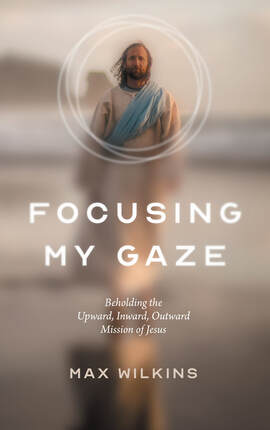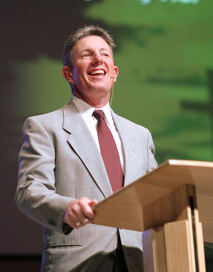Q&A with Max Wilkins
Author of “Focusing My Gaze”

What was your motivation to write this book?
Many believers today are focused on the wrong things, failing to experience the abundant life Jesus promised, and not living the God-designed purpose for which they were created. I truly believe that the focus of our gaze determines the state of our being, and that repentance is literally about refocusing our gaze: turning around and reorienting ourselves toward Jesus. My hope for this book is that readers will consider these truths, and in reorienting their focus, will discover the abundant life Jesus assured us He came to give us.
You say the book is about Jesus yet you use the book of Isaiah as the guide. Why?
Jesus is eternal and was with God (and was God) from the beginning. The story Isaiah relates in chapter 6 is about his personal encounter with “the Lord.” It is “the Lord” that Isaiah sees. It is His glory that fills the whole earth. It is the Lord who is able to pronounce Isaiah cleansed and his sins atoned for, and it is “the Lord’s” mission to which Isaiah is called. God was giving Isaiah a preview of the plan of salvation in Jesus Christ through this encounter. The Apostle John wisely tells us in John 12:41 that Isaiah “saw Jesus’ glory and spoke about Him.” Thus, even though this passage is found in the prophecy of Isaiah, it is all about Jesus, and lays out beautifully God’s salvation plan—not only for Isaiah, but for the entire world.
People today are distracted by many things. How do you suggest people can intentionally focus on God?
Even after I was a follower of Jesus, I was not really connecting with God on a regular basis. I struggled to maintain consistent prayer times, and my Bible reading was sporadic and limited to a few favorite passages. I was already in the ministry in the early 1990’s when I was introduced to the idea of daily meditation on the word of God and journaling what I was hearing from the Lord. I discuss the benefits of this daily practice in the book. This habit changed my ability to focus on God, transforming my prayer life from a wish list for God to a truly two-way conversation between me and the Lord as God spoke to me through His word. And the process of recording what I heard the Lord saying to me allowed me to revisit those writings years later so that I could begin to see the patterns of how God was moving in my life. This one practice was a game-changer in my ability to focus on God in the midst of a chaotic world. Intentionally making space for “the means of grace” in our lives (worship, prayer, communion, fasting, daily meditation on the Word of God, generosity, acts of lovingkindness, etc.) allows God to woo us ever closer to Himself.
What was your motivation to write this book?
Many believers today are focused on the wrong things, failing to experience the abundant life Jesus promised, and not living the God-designed purpose for which they were created. I truly believe that the focus of our gaze determines the state of our being, and that repentance is literally about refocusing our gaze: turning around and reorienting ourselves toward Jesus. My hope for this book is that readers will consider these truths, and in reorienting their focus, will discover the abundant life Jesus assured us He came to give us.
You say the book is about Jesus yet you use the book of Isaiah as the guide. Why?
Jesus is eternal and was with God (and was God) from the beginning. The story Isaiah relates in chapter 6 is about his personal encounter with “the Lord.” It is “the Lord” that Isaiah sees. It is His glory that fills the whole earth. It is the Lord who is able to pronounce Isaiah cleansed and his sins atoned for, and it is “the Lord’s” mission to which Isaiah is called. God was giving Isaiah a preview of the plan of salvation in Jesus Christ through this encounter. The Apostle John wisely tells us in John 12:41 that Isaiah “saw Jesus’ glory and spoke about Him.” Thus, even though this passage is found in the prophecy of Isaiah, it is all about Jesus, and lays out beautifully God’s salvation plan—not only for Isaiah, but for the entire world.
People today are distracted by many things. How do you suggest people can intentionally focus on God?
Even after I was a follower of Jesus, I was not really connecting with God on a regular basis. I struggled to maintain consistent prayer times, and my Bible reading was sporadic and limited to a few favorite passages. I was already in the ministry in the early 1990’s when I was introduced to the idea of daily meditation on the word of God and journaling what I was hearing from the Lord. I discuss the benefits of this daily practice in the book. This habit changed my ability to focus on God, transforming my prayer life from a wish list for God to a truly two-way conversation between me and the Lord as God spoke to me through His word. And the process of recording what I heard the Lord saying to me allowed me to revisit those writings years later so that I could begin to see the patterns of how God was moving in my life. This one practice was a game-changer in my ability to focus on God in the midst of a chaotic world. Intentionally making space for “the means of grace” in our lives (worship, prayer, communion, fasting, daily meditation on the Word of God, generosity, acts of lovingkindness, etc.) allows God to woo us ever closer to Himself.

You talk about taking an inward look at ourselves. In a society that seems to be ever narcissistic, how do you motivate people to look inwardly?
Many people in America want to come to the Good News of Easter without lingering at the cross of Good Friday. The reality is that we don’t even know we need a Savior if we haven’t first taken the inward look and realized, in the light of God’s glory, how short we fall. That said, how we encourage people to take that inward look is a good question. Many people have never slowed down enough to consider the need for it. Ideas like self-reflection and repentance are often missing from the conversations in our churches these days. It is imperative to help people understand the life-giving value of taking an inward look, which is truly part of God’s plan to help us live our best lives. This self-reflection is part of the “good news,” and that may appeal to even the most narcissistic among us.
You talk about focusing on the “abundant life.” That has been given many definitions over the years. What is it exactly?
“Abundant life” has been given many definitions over the years, and most of them are really off base. Any attempt to equate the abundant life of Jesus to piling up material possessions or living “the American Dream” is a disservice to what Jesus was promising. I think it best to allow Jesus’ words themselves to define what His abundant life is really about. The word for life in John 10:10 is the Greek word “zoe.” And zoe absolutely means life, but in the sense of “aliveness, an appetite for life, a zest for living.” Zoe implies a quality of life that is rich and fulfilling. It is a living out of the Hebrew concept of shalom with an emphasis on wholeness or completeness. It is about living our best lives, the lives we were created to live. And the Greek word Jesus uses for “abundant” is a qualitative word, and decidedly NOT a quantitative word. Thus, Jesus is not talking about an abundance of things, but a quality of life. And I truly believe that kind of life can only be experienced as we come to know the One Who created us and begin to allow Him to draw us into the mission we were created for, to shape and form us for that mission, and to release us to live it out in the world.
In the book you say “Grace is free, but not cheap.” What do you mean by that?
Jesus believed that restoring the right relationship between God and humanity was more important than anything. Paul says in Philippians that Jesus, though He was equal with God, refused to cling to His Godhood, but instead “emptied Himself.” That self-emptying was perhaps even more challenging than the Cross for Jesus. Having existed in perfect harmony and love with the Father and the Spirit for all eternity, Jesus voluntarily tore Himself away from that perfect community and perfect love and set aside ALL of His godly prerogatives in order to “humble himself” —to be born in the form of a defenseless and powerless infant, and then to suffer humiliation and death on a cross. All of that was done in complete sacrificial love so that He could make a way to restore humanity to right relationship with His Father. The gracious love of Jesus was freely given, but only at the price of Jesus’ self-emptying, and His suffering and death on the cross. Although Jesus offers that grace to everyone freely, receiving it demands that we give our lives to Him. The offer of “life” in Him is the culmination of His words that anyone who would save his life must lose it, but anyone who loses his life for Jesus will find it. The gift is abundant life, and it is freely given. But the price was Jesus’s sacrifice, and the cost of receiving it is to follow Jesus into that life which requires trading the control of our lives for the abundant living He wants to give us.
Many people in America want to come to the Good News of Easter without lingering at the cross of Good Friday. The reality is that we don’t even know we need a Savior if we haven’t first taken the inward look and realized, in the light of God’s glory, how short we fall. That said, how we encourage people to take that inward look is a good question. Many people have never slowed down enough to consider the need for it. Ideas like self-reflection and repentance are often missing from the conversations in our churches these days. It is imperative to help people understand the life-giving value of taking an inward look, which is truly part of God’s plan to help us live our best lives. This self-reflection is part of the “good news,” and that may appeal to even the most narcissistic among us.
You talk about focusing on the “abundant life.” That has been given many definitions over the years. What is it exactly?
“Abundant life” has been given many definitions over the years, and most of them are really off base. Any attempt to equate the abundant life of Jesus to piling up material possessions or living “the American Dream” is a disservice to what Jesus was promising. I think it best to allow Jesus’ words themselves to define what His abundant life is really about. The word for life in John 10:10 is the Greek word “zoe.” And zoe absolutely means life, but in the sense of “aliveness, an appetite for life, a zest for living.” Zoe implies a quality of life that is rich and fulfilling. It is a living out of the Hebrew concept of shalom with an emphasis on wholeness or completeness. It is about living our best lives, the lives we were created to live. And the Greek word Jesus uses for “abundant” is a qualitative word, and decidedly NOT a quantitative word. Thus, Jesus is not talking about an abundance of things, but a quality of life. And I truly believe that kind of life can only be experienced as we come to know the One Who created us and begin to allow Him to draw us into the mission we were created for, to shape and form us for that mission, and to release us to live it out in the world.
In the book you say “Grace is free, but not cheap.” What do you mean by that?
Jesus believed that restoring the right relationship between God and humanity was more important than anything. Paul says in Philippians that Jesus, though He was equal with God, refused to cling to His Godhood, but instead “emptied Himself.” That self-emptying was perhaps even more challenging than the Cross for Jesus. Having existed in perfect harmony and love with the Father and the Spirit for all eternity, Jesus voluntarily tore Himself away from that perfect community and perfect love and set aside ALL of His godly prerogatives in order to “humble himself” —to be born in the form of a defenseless and powerless infant, and then to suffer humiliation and death on a cross. All of that was done in complete sacrificial love so that He could make a way to restore humanity to right relationship with His Father. The gracious love of Jesus was freely given, but only at the price of Jesus’ self-emptying, and His suffering and death on the cross. Although Jesus offers that grace to everyone freely, receiving it demands that we give our lives to Him. The offer of “life” in Him is the culmination of His words that anyone who would save his life must lose it, but anyone who loses his life for Jesus will find it. The gift is abundant life, and it is freely given. But the price was Jesus’s sacrifice, and the cost of receiving it is to follow Jesus into that life which requires trading the control of our lives for the abundant living He wants to give us.
About Max Wilkins:
|
Max Wilkins is the president and CEO of TMS Global, a global mission society that currently has more than 140 workers serving in 39 countries. A native of Kentucky, he grew up in Florida, and studied at Vanderbilt, South Florida, Emory University, Asbury Theological Seminary, and Oxford. He pastored churches in Florida and Hawaii for thirty years. He and his wife, Dee Dee, have two grown children and live in Peachtree Corners, Georgia.
|
